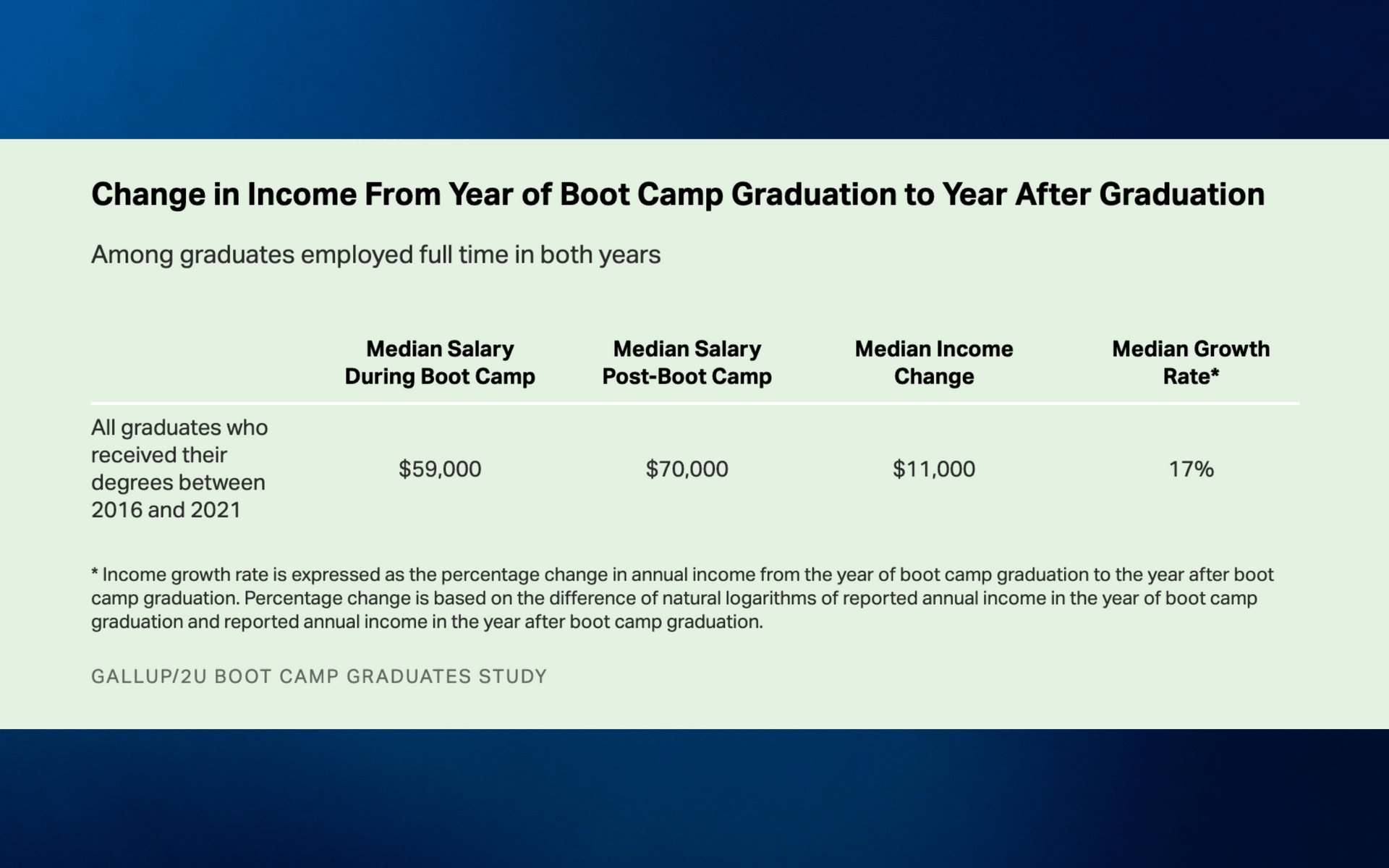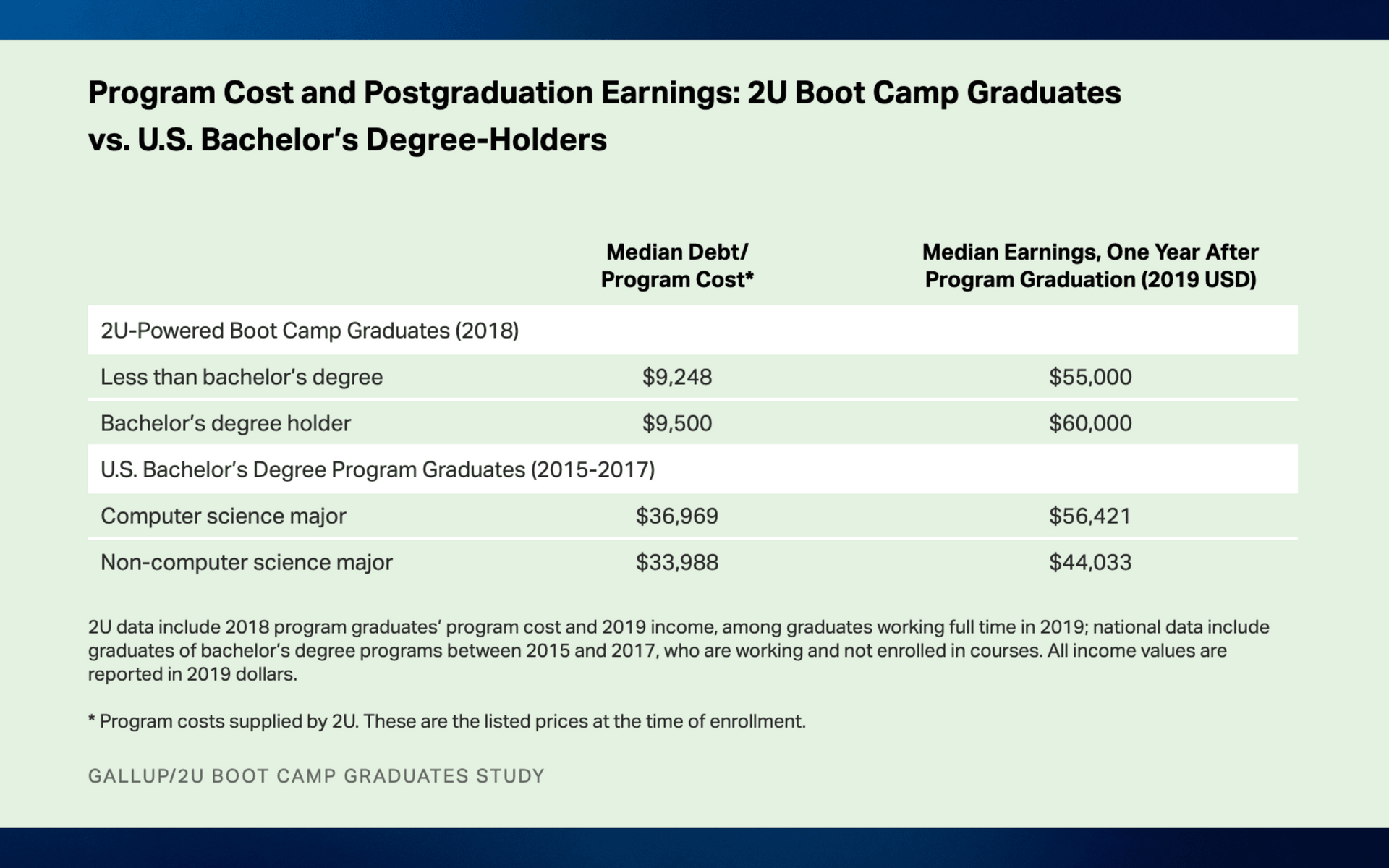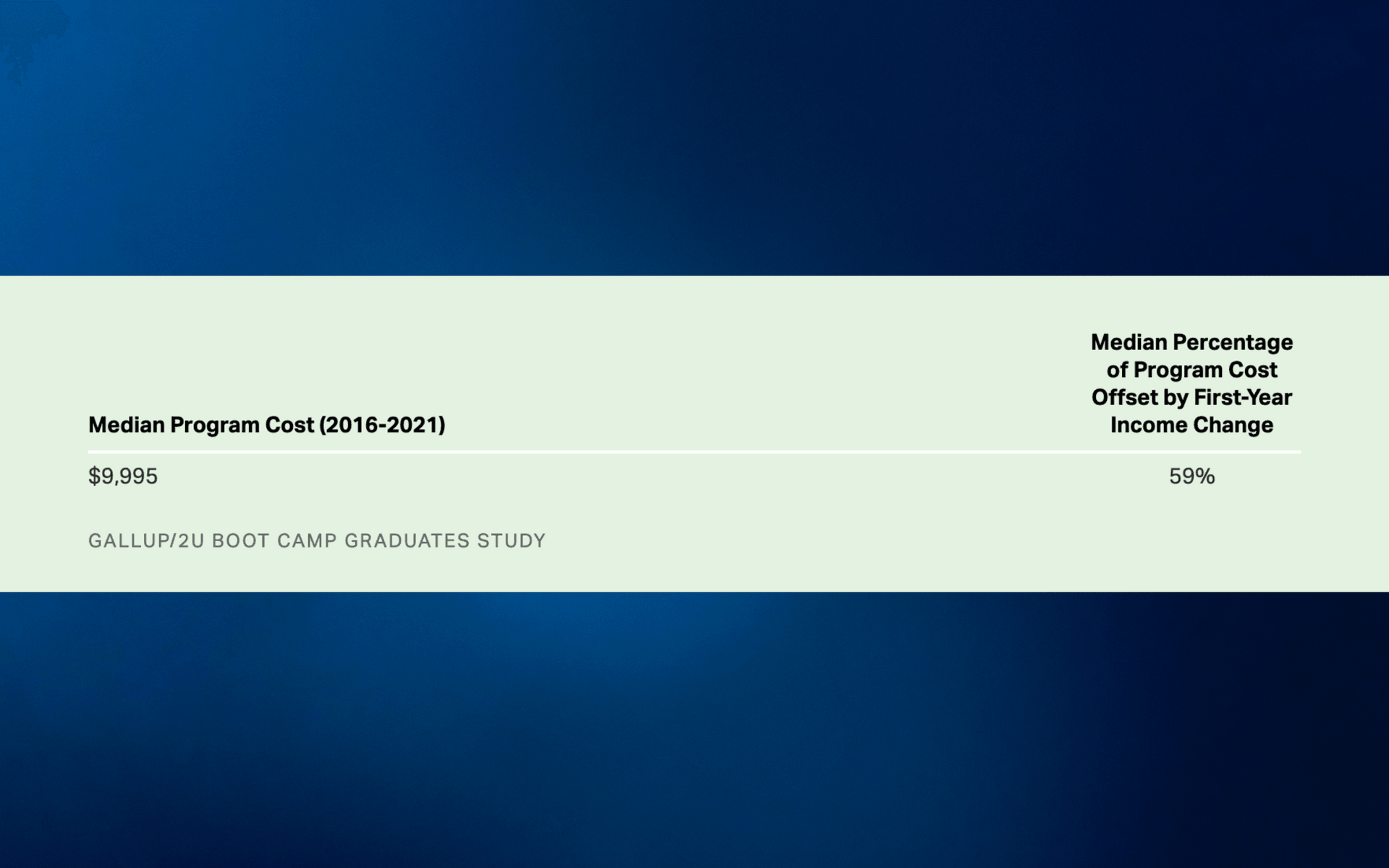Insights
Study Shows 2U Tech Boot Camp Grads See Quick ROI
Written by Gallup on Apr 26, 2022
Related content: Boot Camps, Impact and Outcomes

This article was originally published by Gallup. It is the first in a series that details the major findings from the recent Gallup-2U Boot Camp Graduates Study, which surveyed 3,824 adults in the U.S. who graduated from a 2U-powered university boot camp program between 2016 and 2021.
Tech boot camps -- short, full-time or part-time nondegree programs that teach students in-demand tech skills in areas such as coding, cybersecurity and fintech -- are one example of the many ways that higher education is evolving to try to meet the rising demand for upskilling opportunities.
Tech boot camps appeal to people seeking to quickly start tech careers or gain new skills because they enable students to get alternative credentials in four to six months, and these programs cost less than a four-year degree in computer science.
Despite the proliferation of these boot camps in recent years, including many now offered through a growing number of top-ranked universities¹, data on outcomes for graduates of these and other alternative credential programs remain limited. More research is needed to understand how effective they are in helping learners achieve different career goals.²
A new study by Gallup and educational technology company 2U provides insight into these outcomes, based on interviews with 3,824 graduates of 2U-powered university boot camps, and helps shed light on what high-quality programs look like. 2U partners with more than 50 nonprofit universities to power their boot camp programs. Over more than a decade, 48,000 students have graduated from 2U-powered boot camps.
2U-Powered Boot Camp Graduates Saw Income Boost, Quick Return on Investment
The boot camp graduates surveyed reported earning substantially more money one year after graduation than they were earning while attending the boot camp -- regardless of whether they had bachelor's degrees to begin with.
What's more, even though their programs cost less than a four-year bachelor's degree, when Gallup compared what the boot camp graduates surveyed were earning with earnings data from the Department of Education's College Scorecard, it showed that boot camp graduates were earning just as much as or more than a bachelor's degree-holder did one year after graduation.
One year after their graduation, the median salary for all boot camp graduates surveyed was $11,000 higher than what they said they were earning while they attended boot camp. Among graduates employed full time in both years, median salaries rose from approximately $59,000 during boot camp to $70,000 after boot camp. The median income growth was 17%.

Although graduates of 2U boot camps spent between one-quarter and one-third of what bachelor's degree-holders typically spend on their programs, boot camp graduates reported earning as much or more money in the year after they graduated.
The median 2018 boot camp graduate without a bachelor's degree reported earning nearly as much ($55,000) in the year immediately after their boot camp as the median computer science bachelor's degree graduate ($56,421), and they earned roughly $10,000 more than non-computer science majors ($44,033).³
Boot camp graduates with a bachelor's degree (which accounts for most of the surveyed graduates) earned even higher salaries -- about $5,000 more -- than their counterparts with less than a bachelor's degree. Further, boot camp graduates with bachelor's degrees are outearning U.S. workers of the same age with a bachelor's degree.

In higher education, if the majority of students can recoup what they invested in their degree in 10 years or less, it's considered a reasonable return on investment⁴. By contrast, the higher earnings among boot camp graduates helped them offset more than half of the sticker price of their program in the first year after graduation.
The median boot camp graduate who worked full time during and after their boot camp offset 59% of what their boot camp program cost them with the additional income they earned in the first year after graduation.

Bottom Line
The Gallup-2U Boot Camp Graduates Study offers new, descriptive research on the experiences of technology boot camp graduates. While the findings provide a window into these graduates' experiences, they do not provide a definitive understanding of the causal relationships between boot camps and student outcomes. More research is needed to fully investigate the direct effect that tech boot camps have on students' incomes and careers after graduation.
The findings in this article represent only part of what Gallup and 2U have learned so far from our recent interviews with 2U-powered boot camp graduates.
In the coming weeks, Gallup will publish more articles that delve into the equity of the experiences that these graduates had, as well their satisfaction with their jobs before and after graduation. Gallup will also share what some employers had to say about boot camps.
The full results from the study will be released in a report this summer.
Footnotes
[1] Schwartz, N. (2021). More colleges are partnering with boot camps to tap demand for short-term programs. Higher Ed Dive. Retrieved from: https://www.highereddive.com/news/more-colleges-are-partnering-with-boot-camps-to-tap-demand-for-short-term-p/594295/#:~:text=Full%2Dtime%20enrollment %20in%20U.S.,2019%2C%20according%20to%20Course%20Report
[2] Arbeit, C. A., Bentz, A., Cataldi, E. F., and Sanders, H. (2019). Alternative and Independent: The Universe of Technology-Related "Bootcamps." RTI Press Publication No. RR-0033-1902. Research Triangle Park, NC: RTI Press. https://doi.org/10.3768/rtipress.2018.rr.0033.1902
[3] To compare the earnings of boot camp graduates to those of graduates from bachelor's degree programs, Gallup obtained data from the Department of Education's College Scorecard. It uses tax records from the U.S. Treasury to match earnings to students for all students who received federal grants or loans during their enrollment. The latest data available are for students who completed computer science programs during the 2015-2016 and 2016-2017 academic years. Their earnings are reported in 2019 dollars, after adjusting for inflation, and reflect annual earnings in the year immediately after graduation.
[4] Itzkowitz, M. (2021). Which college programs give students the best bang for their buck? Report published by Third Way. Retrieved from www.thirdway.org/report/which-college-programs-give-students-the-best-bang-for-their-buck.
Latest.
Learn more about us.
At 2U, we’re on a mission—to eliminate the back row in higher education and help partners thrive in the digital age. To learn more about who we are and what we do, follow the links below.